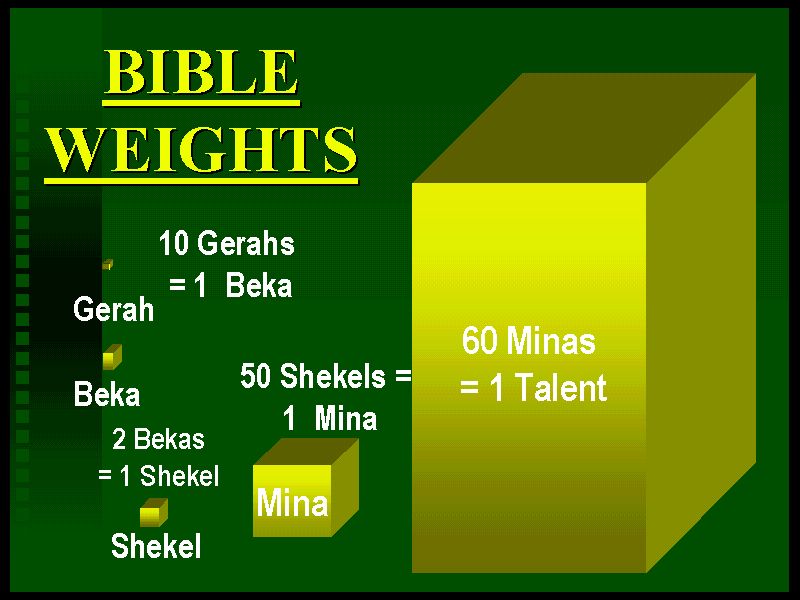The Parable of the Talents of The Rich King
“Use the abilities that God gave you at birth or God is displeased.” This is a summary of the meaning of the Parable of the Talents, ….right?
I don’t think so. The word ‘Talents’ means two things in English today.
- Talent (verb) – intellectual ability, natural or acquired, mental endowment or capacity, inclination
- In Hebrew (noun) among the Hebrews a unit or weight of money equal to as much as $500,000 depending on the metal.
When Jesus was preaching this description of his kingdom Talents meant an amount of money. When Jesus taught this parable talents meant weight of money not general aptitudes or abilities. It was not about using our talents in a natural sense, it is about what we do with our financial resources.
Someone Greatly Expanded the Meaning of the English Word Talent
Talent was the name of a unit of weight and money in the ancient world. The Christian Bible has a story about a man who gave three servants talents to keep for him while he was away. The first two servants invested their money and doubled it. The third hid the talent he had been given in the ground. When the master returned, he praised the first two servants. But he scolded the third, who could give back only what he had been given. The meaning of the story is that people should make good use of their natural gifts. From this story came a new meaning of talent: “special gift”. (taken from Merriam Webster.)
This new meaning occurred in the 12th century AD. Could it be that someone in the 12th century wanted the word to NOT mean the money that we ought to set aside for the poor? And instead make it mean something, anything but money?
Wikipedia claims that the value of a talent was as much as $500,000!
Parable of The Rich King with Talent/ Dollar Equivalents
Matthew 25:14 For it (what ‘it’ is he talking about? This parable is another on the topic of the start of the first parable in this teaching, 25:1 ‘the kingdom of heaven’) is just like a man about to go on a journey, who called his own slaves (these people belonged to Jesus) and entrusted his possessions to them. 15 To one he gave five talents ($2,500,000), to another, two ($1,000,000) and to another, one ($500,000), each according to his own ability; and he went on his journey. 16 Immediately the one who had received the five talents ($2,500,000), went and traded with them, and gained five ($2,500,000), more talents. 17 In the same manner the one who had received the two talents ($1,000,000) gained two ($1,000,000) more. 18 But he who received the one talent ($500,000), went away, and dug a hole in the ground and hid his master’s money (still talking money here). 19 Now after a long time the master of those slaves came (it seems long but the king, the bridegroom, the master is surely coming) and settled accounts with them. 20 The one who had received the five talents ($2,500,000), came up and brought five talents more ($2,500,000), saying, ‘Master, you entrusted five talents ($2,500,000) to me. See, I have gained five talents more ($2,500,000).’ His master said to him, ‘Well done, good and faithful slave. You were faithful with a few things, I will put you in charge of many things; enter into the joy of your master (notice the joy of the master is associated with being in charge of his many things).’ 22 Also the one who had received the two talents came up and said, ‘Master, you entrusted two talents ($1,000,000) to me. See, I have gained two talents more ($1,000,000). 23 His master said to him, ‘Well done, good and faithful slave. You were faithful with a few things, I will put you in charge of many things enter into the joy of your master.’(again joy associated with being put in charge of his the master’s many things.)
The Worthless Slave
24 And the one also who had received the one talent ($500,000), came up and said, ‘Master, I knew you to be a hard man, reaping where you did not sow and gathering where you scattered no seed. 25 And I was afraid, and went away and hid your talent ($500,000) in the ground. See, you have what is yours.’ 26 “But his master answered and said to him, ‘You wicked, lazy slave, you knew that I reap where I did not sow and gather where I scattered no seed. 27 Then you ought to have put my money in the bank, and on my arrival I would have received my money back with interest.(Jesus is expecting a return on his valuable gifts to us.) 28 Therefore take away from him, and give it to the one who has the ten talents ($5,000,000),.’ 29 “For to everyone who has, more shall be given, and he will have an abundance; but from the one who does not have, even what he does have shall be taken away. 30 Throw the worthless slave into outer darkness; in that place there will be weeping and gnashing of teeth. 31 But when the son of man comes in his glory, and all the angles with him, then he will sit on his glorious throne. 32 All the nations will be gathered before him; and he will separate them from one another, as the shepherd separates the sheep from the goats; and He will put the sheep on his right, and the goats on the left. 34 Then the King will say to those on his right, ‘Come, you who are blessed of my Father, inherit the kingdom prepared for you from the foundation of the world, 35 For I was hungry, and you gave me something to eat; I was thirsty, and you gave me something to drink; I was a stranger, and you invited me in; 36 naked, and you clothed me; I was sick and you visited me; I was in prison and you came to me.’ Then the righteous will answer Him, ‘Lord when did we see you hungry and feed you, or thirsty, and give you something to drink? 38 And when did we see You a stranger and invite you in, or naked, and clothe you? 39 When did we see You sick, or in prison, and come to You?’ 40 The king will answer and say to them, ‘Truly I say to you, to the extent that you did it to one of these brothers of Mine, even the least of them, you did it to me.’(here Jesus identifies with the poor, lonely naked, prisoners) …45 Then he will answer them, ‘Truly I say to you to the extent that you did not do it to the one of the least of these, you did not do it to Me.’ (he repeats the identification with the least) 46 These will go away into eternal punishment, but the righteous into eternal life.”
Several things to notice in Matthew 25, in a sense he uses 3 parables here to make the same or similar point.
Jesus is in the process of preaching the gospel of the kingdom in this chapter, these parables should not be viewed as independent from one another. They are not different blocks of wisdom to view in isolation. No all three portions of Matthew 25 go together as yet a further description of how things are in Jesus’ kingdom. The first of this gospel message being the bridegroom and virgins. The second is the rich king giving money to his slaves to manage while he is way. Finally the sheep and goats being judged after the return of the shepherd.
Jesus Is with The Poor and Oppressed
All these parables describe how things are in the kingdom of God and the return that the rich king expects upon his return.
All three have the synonymous messages of being prepared for the bridegroom. Investing the money that God gives to us into the least of these.
Us giving to the poor is synonymous with the King getting a return on his money while he is away.
We essentially are him on the earth. He “came to seek and to save that which was lost”. He associated with the lowly (hungry) and the sinners (in prison).
This agrees with many other things Jesus taught. “Blessed are the meek and lowly.” Jesus wants to continue his ministry to the poor and undo Satan’s dominion through us. Also remember Jesus told John that ‘the gospel was being preached to the poor’ as a sign about who he is. He is pleased with us as we continue this giving and preaching the kingdom to the poor.
He even provides for the poor who come into the kingdom by the sharing of our wealth within the ecclesia. Remember he said “so there is equality” concerning the provision of money one to another in 2 Cor 8:13-14.
In the next post I will continue with this parable an. I hope to show how important the poor and least of these are to Jesus Christ.




